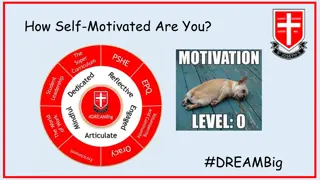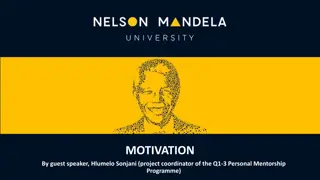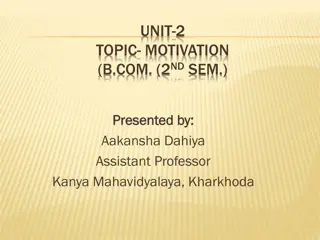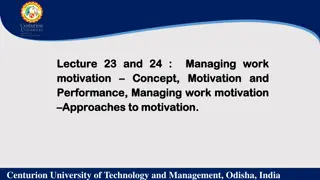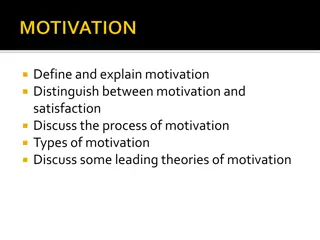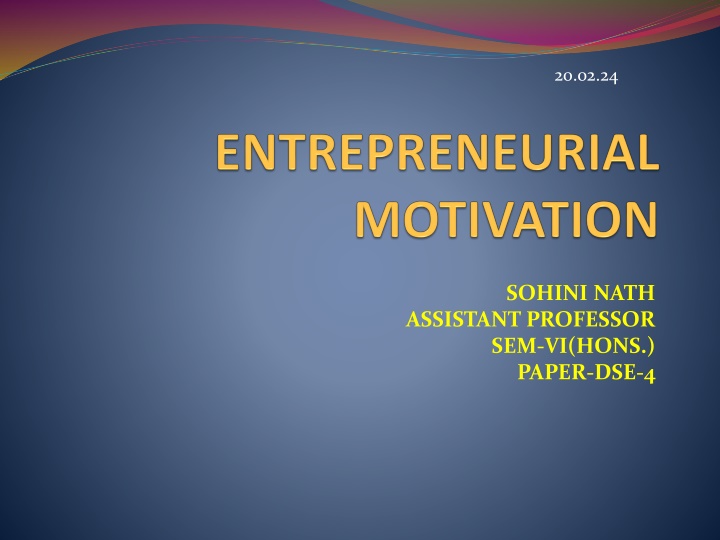
Motivation Theories and Factors
Explore the concept of motivation, including its definition, theories like Maslow's Need Hierarchy and McClelland's Acquired Needs, motivating factors, and real-life examples like the Kakinada Experiment. Discover how internal and external factors drive human behavior towards achieving goals.
Download Presentation

Please find below an Image/Link to download the presentation.
The content on the website is provided AS IS for your information and personal use only. It may not be sold, licensed, or shared on other websites without obtaining consent from the author. If you encounter any issues during the download, it is possible that the publisher has removed the file from their server.
You are allowed to download the files provided on this website for personal or commercial use, subject to the condition that they are used lawfully. All files are the property of their respective owners.
The content on the website is provided AS IS for your information and personal use only. It may not be sold, licensed, or shared on other websites without obtaining consent from the author.
E N D
Presentation Transcript
20.02.24 SOHINI NATH ASSISTANT PROFESSOR SEM-VI(HONS.) PAPER-DSE-4
WHAT IS MOTIVATION? Motivation has been derived from the word motive . It may be defined as an inner state of our mind that moves or activates and directs our behaviour towards our goals. Motives are expressions of a person s goals or needs, In simple terms ,motives or needs are ways of behaviour. They give direction to human behaviour to achieve goals or fulfill needs.
MOTIVATION THEORIES MASLOW S NEED HIERARCHY THEORY. Mc CLELLANDS ACQUIRED NEEDS THEORY.
PROCESS OF MOTIVATION Motive Behavio ur Goal
Maslows Need Hierarchy Theory 5 4 Self- Actualisa tion Needs Esteem and Status Needs 2 3 Safety and Security Needs 1 Social Needs Physiol ogical Needs
Mc Cleland's Acquired Needs Theory According to David Mc Cleland person acquires three types of needs as a result of one s life experience. These three needs are: i)Need for Affiliation Ii)Need for Power Iii)Need for Achievement.
MOTIVATING FACTORS A.INTERNAL FACTORS a)Desire to do something new b)Educational background c)Experience B.EXTERNAL FACTORS a)Government assistance and support b)Availability of labour and raw material c)Encouragement from big business houses. D)Promising demand for the product.
ACHIEVEMENT MOTIVATION KAKINADA EXPERIMENT Motivation can be developed through training and education. The Kakinada Experiment in India supports it. The experiment was conducted in Kakinada an industrial town in Andhra Pradesh. Experiment started in January 1964. It was conducted on 250 persons and a training programme was given to them for 3 months. The impact of the training was observed after a period of 2 years. It was found that those who attended the programme performed better. The experiment thus showed us that entrepreneurship is to be developed from a young age and that they have to be given training and education to develop motivation.








